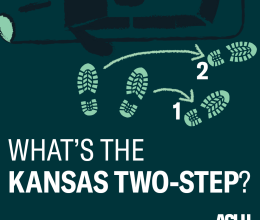
OVERLAND PARK, KS - The Tenth Circuit Court ruled Monday that an ACLU of Kansas lawsuit claiming the state highway patrol routinely and illegally stopped motorists with out of state license plates, can continue.
“The Court’s decision is a win for our clients and a win for the rights the Fourth Amendment guarantees us all,” said Senior Staff Attorney for the ACLU of Kansas, Josh Pierson. “Because of this decision, we can get back to the business of preparing for trial, and we look forward to pressing our case.”
In both stops at issue, the ACLU of Kansas’ clients alleged the highway patrol unconstitutionally detained them on the side of the road. The troopers then asserted qualified immunity and moved for summary judgment, arguing that they had reasonable suspicion to detain the plaintiffs and qualified immunity shielded them from liability. The District Court denied the troopers’ motions and they appealed.
In sum, the Court on Monday agreed that qualified immunity should not apply based on the facts the troopers presented. The Court held that, on the record before it, a jury could conclude the troopers lacked reasonable suspicion to detain the plaintiffs.
The stops at issue are also examples of the larger issues raised by the lawsuit. The affiliate filed the case, Shaw v. Jones, in January of 2020, challenging KHP’s practice of unconstitutionally targeting motorists with out-of-state plates traveling to and from Colorado (a state that has legalized marijuana) and routinely employing a training technique known as, the “Kansas Two-Step.”
Drivers with out-of-state plates made up 93 percent of KHP stops in 2017, according to the class-action lawsuit, filed on behalf of three plaintiffs, Blaine Shaw, Samuel Shaw and Joshua Bosire. Further, out-of-state motorists driving through Kansas on I-70 constituted 96 percent of all KHP’s civil forfeitures in 2019. Most of those motorists were people of color.
This is done via a training method known as “The Kansas Two-Step.”
After issuing a ticket or warning for the initial stop, the officer turns his or her body, takes two steps toward the patrol cruiser, but then asks if the driver would answer a few more questions. The patrol argues that this technique breaks off an initial traffic detention and is an attempt to reengage the driver in a consensual encounter. It is taught to all KHP officers and is included in KHP’s training materials.
The standard for this kind of invasion of privacy has to be higher than out-of-state plates, a Colorado destination, and minority status. In 2016, the Tenth Circuit found that a KHP trooper illegally relied on a driver’s out of state license and other innocuous conduct to support their “reasonable suspicion” that the driver was trafficking drugs.
Monday’s decision reaffirms that the Fourth Amendment requires officers to have reasonable suspicion—based on articulable facts, not mere hunches—to detain people after a traffic stop. It also reaffirmed that travel to or from so-called “drug source” states should play little, if any role, in an officer’s justification for a prolonged detention.
# # #
About the ACLU of Kansas: The ACLU of Kansas is the statewide affiliate of the national American Civil Liberties Union. The ACLU of Kansas is dedicated to preserving and advancing the civil rights and legal freedoms guaranteed by the United States Constitution and the Bill of Rights. For more information, visit our website at www.aclukansas.org.